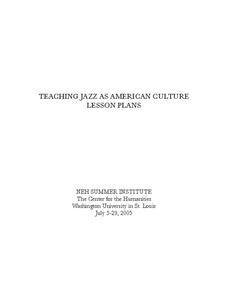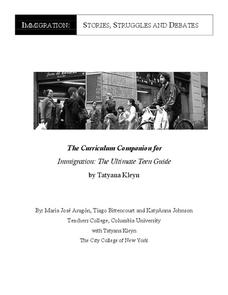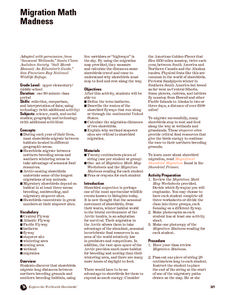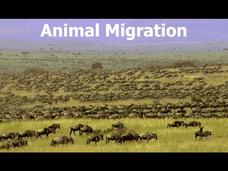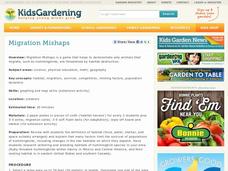Washington University in St. Louis
Teaching Jazz as American Culture
Jazz and the City, Jazz and the Civil Rights Movement, Jazz and Gender, Jazz and Literature, Jazz and the Arts, Jazz and Film. Here's a packet of unit plans organized around themes that reflect American culture. Each unit examines how...
Curated OER
Immigration: Stories, Struggles and Debates
Considering including Tatyana Kleyn's Immigration: The Ultimate Teen Guide as part of your course? Check out this curriculum guide designed for use with her book. The activities help learners understand the complexity of the...
Chicago Botanic Garden
Seed Dispersal and Plant Migration
There are five methods of seed dispersal. They include gravity, mechanical, animal, water, and air. Scholars study seed dispersal in lesson five of the series of six. Through discussions, hands-on analysis of different seed types, and...
UNICEF
Refugees and IDPs Activities
Class members have an opportunity to consider issues faced by refugees and Internally Displaced Persons (IDPs) by participating in a series of activities that illustrate some of the challenges refugees experience.
Advocates for Human Rights
Creating a Welcoming School and Community
The final activity in a unit study of immigration and human rights asks class members to design a project for their school that builds support for immigrant classmates. To prepare for this project, individuals use what they have learned...
Advocates for Human Rights
A Global Perspective on Immigration
To gain a global perspective on immigration, groups investigate and create a map of the migration patterns in Africa, Asia, Europe, Latin America, and the Middle East. Class members then examine the background, immigration history, and...
Advocates for Human Rights
The Rights of Immigrants in the United States
Based on their understanding of the Universal Declaration of Human Rights and the Rights of Migrants in the United States, groups adopt a human rights perspective and analyze media reports to evaluate how the US is addressing the...
Advocates for Human Rights
Human Rights Defined
Class members continue their investigation of the factors that influence migration with a lesson on human rights. As they examine the Universal Declaration of Human Rights and selected US Constitutional Amendments, learners compare the...
Museum of Tolerance
Where Do Our Families Come From?
After a grand conversation about immigration to the United States, scholars interview a family member to learn about their journey to America. They then take their new-found knowledge and apply their findings to tracking their family...
Museum of Tolerance
Immigration Journeys
Through the journey of four stories of immigration, scholars complete graphic organizers and apply knowledge to create a visual representation of their findings on a large poster. Third and fourth readers write a letter to their...
EduGAINs
Migration—Push and Pull Factors
What causes people to move from one place, one city, or one country to another? Using the provided migration questionnaire, learners interview family members about the factors that cause them to be pushed from an area or pulled to...
Illinois Department of Natural Resources
Section One: What is Biodiversity?
Four intriguing and scientific activities invite learners to explore the natural resources of their town. The activities cover concepts such as genetic traits, organizing species in a taxonomy, the differences between different species...
World Wildlife Fund
Land of the Midnight Sun
From days of 24 hour sunlight, to endless nights that last for days, the Arctic is a very unique place to live. Examine the seasonal changes that occur in the northern-most reaches of the globe and the impact they have on the plants and...
National Wildlife Federation
Massive Migrations
Turn your students into flocks of migratory birds for this fun lesson on animal migration. Prior to the activity, the teacher creates four different migration routes in the classroom or any available open space, labeling nesting...
Prince William Network
The Incredible Journey
Divide your school gym into breeding grounds and non-breeding grounds so that your zoologists can play a game simulating the seasonal migration of shorebirds. Players pick one of the included game cards and follow its directions, which...
Prince William Network
Migration Headache
During this game, kids become migratory shorebirds and fly among wintering, nesting, and stopover habitats. If they do not arrive at a suitable habitat on time, they do not survive. Catastrophic events are periodically introduced that...
Prince William Network
Migration Math Madness
A great way to incorporate math into life science, this lesson has learners measure migratory routes on a map and calculate the actual distance that shorebirds on the routes would cover. Learners compute the distance covered in both...
University of Washington
Animal Migration
Here is a unique resource to use with middle and high schoolers that deals with animal migration. Viewers discover the reasons for, types of, and animals that practice this behavioral adaptation. Specific animals that are introduced...
National Gardening Association
Migration Mishaps
Elementary ecologists pretend to be migratory hummingbirds. They fly between wintering and nesting grounds, trying to reach a habitat haven. In a musical-chair fashion, some birds will miss out, and are removed from the game. To further...
California Academy of Science
Coincidental Colonization
The Galápagos Islands are an amazing place of isolated adaptation, colonized by an interesting mix of plants and animals. The class plays a game to help them understand how these organisms came to live on the island through a combination...
Curated OER
Massive Migrations
Here is an exciting exploration of a fascinating topic for your emerging ecologists: bird migration! They begin by visiting the US Fish & Wildlife Service website to discover which Arctic birds come to their areas. They are assigned...
Curated OER
Does It Move On It's Own?
Young scientists look at drawings of six animals, then match up a word that describes how they move. The words are: hop, crawl, swim, fly, run, and jump. They also answer two additional questions about the animals and how they move. A...
Curated OER
The Great Depression and The Dust Bowl
First take a look at images from the Dust Bowl, then discuss its causes and effects. Captured here are primary source images taken by Dorothea Lange, informational text, and a diagram that shows the causes and consequences of this major...
Curated OER
Life in the Dust Bowl
Learners consider the accuracy of the book Out of the Dust as they view primary source images taken during the Dust Bowl. Each slide contains an image, a question, and a quote from the book. This would be great to use when covering...


